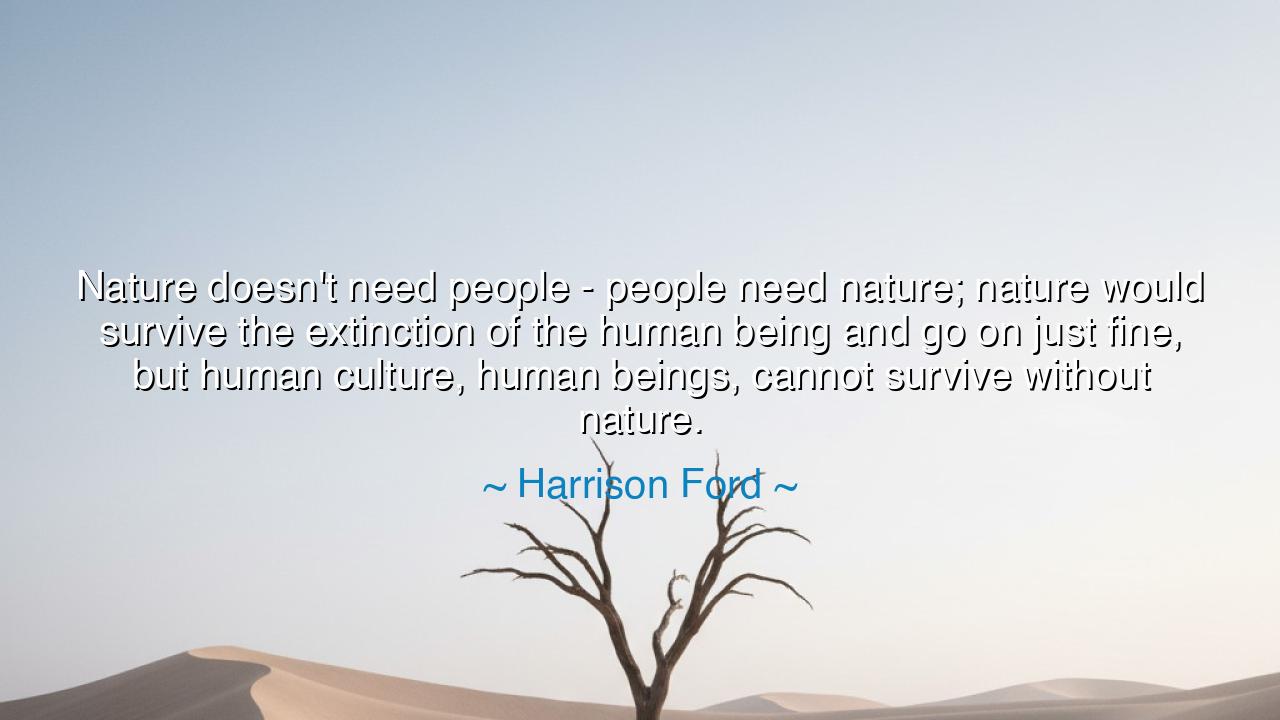
Nature doesn't need people - people need nature; nature would
Nature doesn't need people - people need nature; nature would survive the extinction of the human being and go on just fine, but human culture, human beings, cannot survive without nature.






The words of Harrison Ford—“Nature doesn't need people - people need nature; nature would survive the extinction of the human being and go on just fine, but human culture, human beings, cannot survive without nature”—resound as a warning carved in the eternal voice of the earth. They remind us that nature is not fragile in the way we imagine; she has endured fire, ice, and the rise and fall of countless species. It is man, not the earth, who stands in peril. For we depend upon her soil, her waters, her air, her forests; but she depends upon nothing from us. If we perish, she will heal. If she perishes, so too shall we.
The origin of this truth lies not in modern thought alone, but in the very history of life itself. For millions of years before humankind, the seas roared, the mountains rose, and forests stretched across the world. Civilizations are but recent guests in a house that has stood since time’s beginning. Ford’s words strip away our arrogance, reminding us that though we may master technologies, conquer continents, and write laws, we remain as fragile as children in the lap of the earth. Culture is built upon her foundation; without it, our greatest towers and libraries crumble into dust.
History gives us examples of societies that forgot this law. The people of Easter Island felled their forests in pursuit of monuments, leaving themselves barren and vulnerable. The Mayan civilization, weakened by deforestation and drought, collapsed into ruin. In each case, the people believed themselves masters of nature, only to discover too late that their survival was bound to the very systems they destroyed. Nature endured their folly, but their cultures did not. Thus Ford’s warning is not poetic exaggeration, but a pattern written again and again upon the chronicles of time.
The emotional power of his words lies in the reversal of perspective. Too often, we speak as though nature needs our protection, as though she were delicate and helpless without us. But in truth, it is we who are helpless without her. The rivers, the forests, the skies—they are not ornaments to be admired, but the breath of our lungs, the food of our bodies, the life of our souls. Nature will flourish long after we are gone, reclaiming our cities with vines and silence. But if we destroy her balance while we yet live, we destroy ourselves.
There is something heroic in this teaching, for it calls upon humanity not to dominate but to steward. To live in harmony with the earth is not weakness but wisdom. The hunter who respects the herds, the farmer who honors the soil, the builder who leaves the forest standing—these are not acts of limitation but of strength. They ensure not only survival, but abundance. The true measure of civilization is not how much it conquers nature, but how well it endures alongside her.
The lesson for us is clear: we must abandon the arrogance that imagines humanity as master of the earth. We are not her rulers, but her children. To safeguard her is to safeguard ourselves. To poison her is to poison our own blood. In every action—what we consume, what we waste, what we build—we must remember that we walk upon a living foundation, and that our survival depends upon her continued strength.
What, then, shall we do? Let us plant where we have cut, restore where we have taken, heal where we have wounded. Let us live with restraint, with reverence, with gratitude. Let us honor the rivers and forests as sacred, for they are not resources alone but the roots of our being. And let us teach our children not the lie that nature depends on us, but the truth that we depend on her. In this way, we may yet preserve both her beauty and our place within it.
Thus, Harrison Ford’s words, though spoken in our age, echo with the timeless wisdom of the ancients: nature does not need people—people need nature. She will endure our folly if we fall, but if we honor her, she will sustain us. The choice lies before us like two paths: destruction, or harmony. And from that choice shall be written the destiny of humanity.






AAdministratorAdministrator
Welcome, honored guests. Please leave a comment, we will respond soon